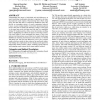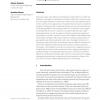20 search results - page 2 / 4 » Display time as implicit feedback: understanding task effect... |
MHCI
2004
Springer
13 years 10 months ago
2004
Springer
: The complex usage of mobile devices coupled with their limited resources in terms of display and processing suggests that being able to understand the context of the user would b...
SMC
2007
IEEE
13 years 11 months ago
2007
IEEE
— The computational understanding of continuous human movement plays a significant role in diverse emergent applications in areas ranging from human computer interaction to phys...
AOSD
2007
ACM
13 years 8 months ago
2007
ACM
Most current software systems contain undocumented high-level ideas implemented across multiple files and modules. When developers perform program maintenance tasks, they often wa...
WSDM
2012
ACM
2012
ACM
Large-scale analysis of individual and task differences in search result page examination strategies
12 years 8 days ago
Understanding the impact of individual and task differences on search result page examination strategies is important in developing improved search engines. Characterizing these e...
PRESENCE
2000
13 years 4 months ago
2000
Endoscopic surgery, while offering considerable gains for the patient, has created new difficulties for the surgeon. One problem is the fulcrum effect, which causes the movement o...


